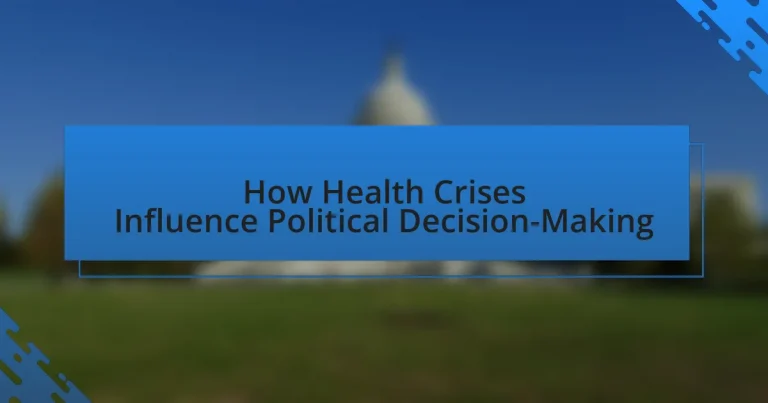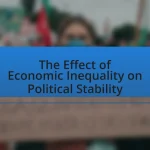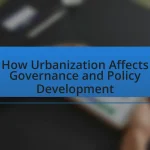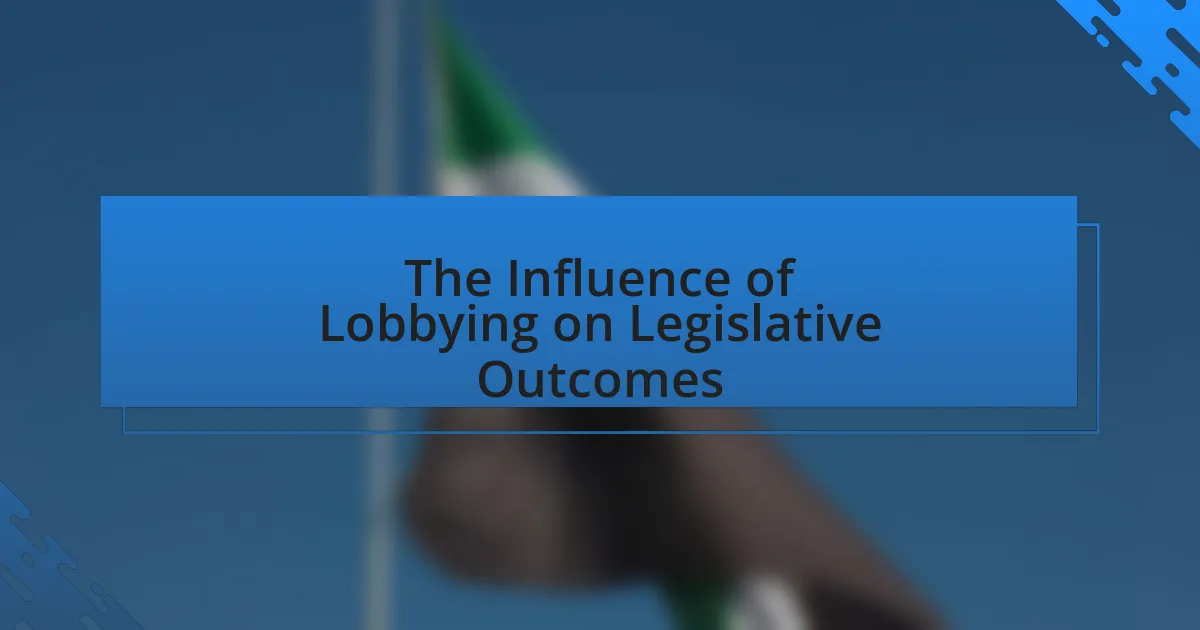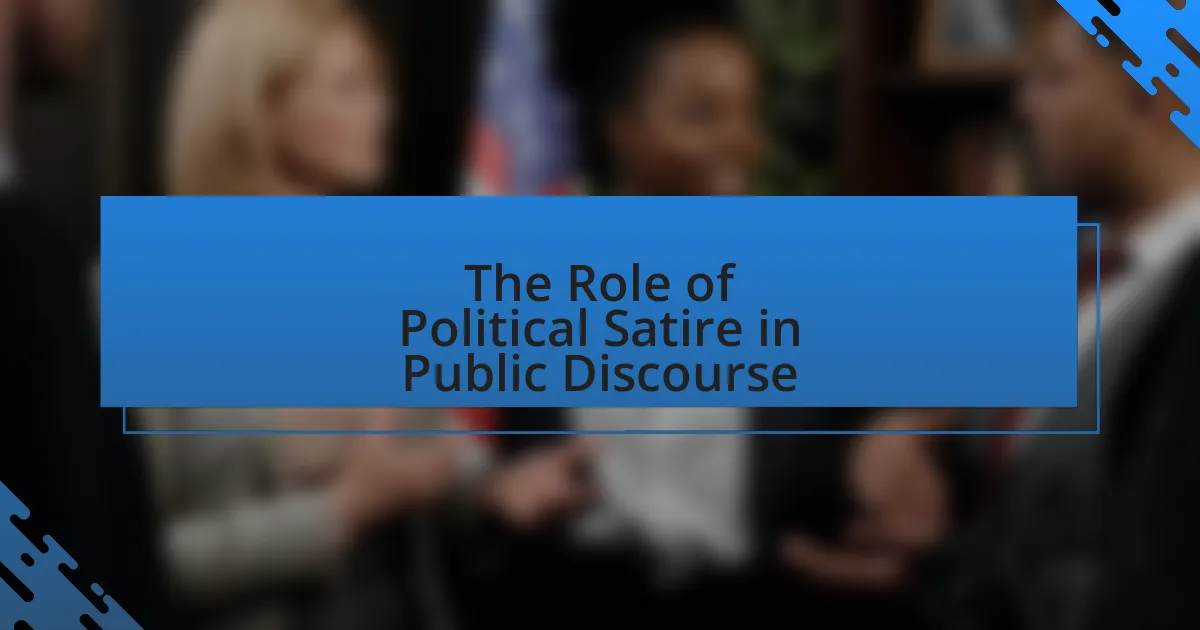Health crises, such as the COVID-19 pandemic, significantly impact political decision-making by prompting governments to prioritize public health measures and allocate resources effectively. Historical examples, including the 1918 influenza pandemic and the HIV/AIDS epidemic, illustrate how health emergencies can lead to substantial policy shifts and changes in governance strategies. The article explores the factors influencing political responses during health crises, the role of international organizations like the World Health Organization, and the importance of public perception and media coverage in shaping political actions. Additionally, it discusses best practices for future health crisis management, emphasizing the need for collaboration with health experts and transparent communication to enhance public trust and improve outcomes.
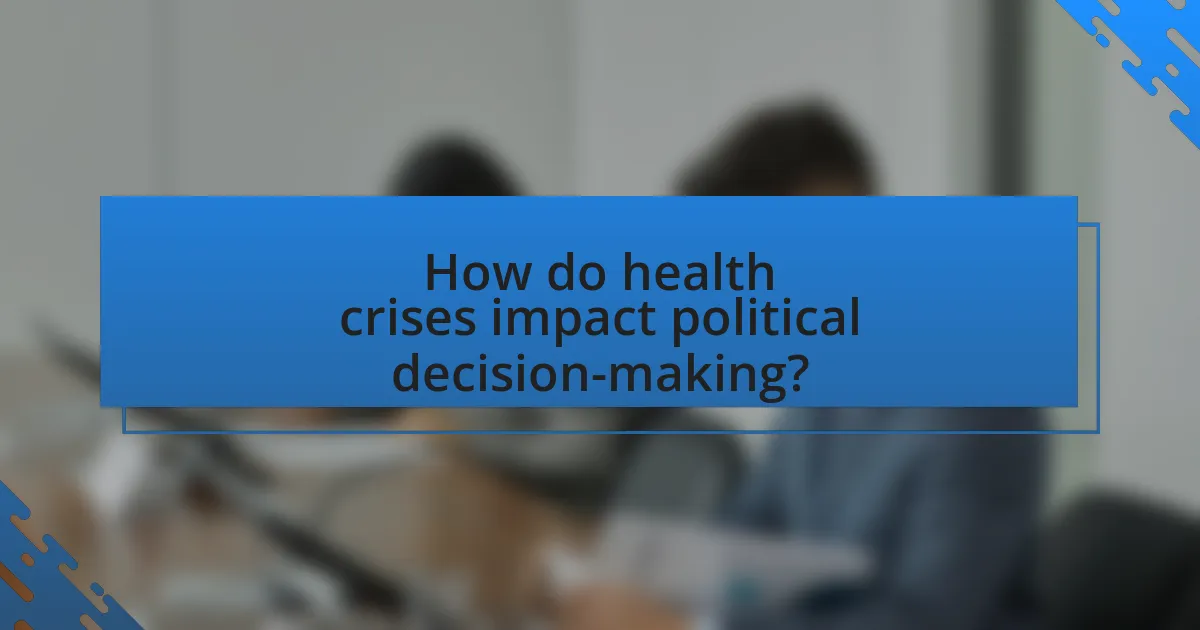
How do health crises impact political decision-making?
Health crises significantly influence political decision-making by prompting governments to prioritize public health measures and allocate resources accordingly. For instance, during the COVID-19 pandemic, many countries implemented emergency policies, such as lockdowns and travel restrictions, to mitigate the spread of the virus. This shift in focus often leads to changes in legislative priorities, as seen in the United States where the pandemic prompted the passage of the CARES Act, providing economic relief to individuals and businesses. Additionally, health crises can alter public opinion, compelling political leaders to respond swiftly to maintain public trust and support, as evidenced by the varying approval ratings of leaders based on their handling of the pandemic.
What are the historical examples of health crises influencing political decisions?
Historical examples of health crises influencing political decisions include the 1918 influenza pandemic, which led to significant changes in public health policies and the establishment of health departments in various countries. The pandemic prompted governments to implement quarantine measures, travel restrictions, and public health campaigns, fundamentally altering how health crises were managed. Another example is the HIV/AIDS epidemic in the 1980s, which forced political leaders to address stigma, allocate funding for research and treatment, and develop comprehensive health strategies, significantly impacting healthcare policies and funding priorities. Additionally, the COVID-19 pandemic in 2020 resulted in widespread political decisions regarding lockdowns, vaccine distribution, and public health funding, reshaping global health governance and emergency preparedness frameworks. These instances demonstrate how health crises can catalyze substantial political and policy shifts in response to urgent public health needs.
How did the COVID-19 pandemic shape government policies worldwide?
The COVID-19 pandemic significantly shaped government policies worldwide by prompting rapid responses in public health, economic support, and social regulations. Governments implemented lockdowns, travel restrictions, and mask mandates to curb virus transmission, reflecting a prioritization of public health over economic activities. For instance, countries like Italy and Spain enforced strict lockdown measures early in the pandemic, which were later adopted by many nations globally. Additionally, governments introduced economic stimulus packages, such as the U.S. CARES Act, which provided financial assistance to individuals and businesses, illustrating a shift towards increased government intervention in the economy during crises. These policy changes were driven by the need to manage the immediate health crisis while also addressing the economic fallout, demonstrating how health emergencies can lead to significant alterations in political decision-making and governance strategies.
What lessons were learned from past health crises like the Ebola outbreak?
The Ebola outbreak taught critical lessons about the importance of rapid response and effective communication in health crises. The World Health Organization (WHO) reported that delays in response contributed to the outbreak’s spread, highlighting the need for timely interventions. Additionally, the outbreak underscored the necessity of international collaboration, as countries must work together to share information and resources to combat infectious diseases effectively. The experience also revealed the significance of public trust in health authorities, as misinformation can hinder response efforts. These lessons emphasize that preparedness, transparency, and cooperation are essential for managing future health crises.
Why do political leaders respond differently to health crises?
Political leaders respond differently to health crises due to variations in political ideology, governance structures, public health infrastructure, and societal values. For instance, leaders in countries with strong public health systems, like Germany, often implement swift and effective measures during health crises, as seen during the COVID-19 pandemic, where early testing and contact tracing were prioritized. In contrast, leaders in nations with weaker health systems may struggle to respond effectively, leading to delayed actions and higher mortality rates, as evidenced in the early stages of the pandemic in the United States. Additionally, political leaders’ responses are influenced by their electoral considerations, where some may prioritize economic impacts over public health to maintain voter support, further complicating their decision-making processes.
What factors influence the urgency of political responses during health emergencies?
The urgency of political responses during health emergencies is influenced by several key factors, including the severity of the health threat, public perception, and the availability of resources. The severity of the health threat, such as the transmission rate of a disease or its mortality rate, directly impacts how quickly political leaders feel compelled to act. For instance, the rapid spread of COVID-19 in early 2020 prompted immediate lockdowns and policy changes across many countries. Public perception also plays a crucial role; if the public is highly concerned about a health crisis, political leaders may respond more swiftly to maintain trust and support. Additionally, the availability of resources, including medical supplies and funding, can either facilitate or hinder timely political action. For example, countries with robust healthcare systems and emergency preparedness plans were able to implement responses more rapidly than those without such resources.
How do public perceptions and media coverage affect political decision-making?
Public perceptions and media coverage significantly influence political decision-making by shaping the priorities and actions of policymakers. When the media highlights specific issues, such as health crises, it can create a sense of urgency among the public, prompting politicians to respond swiftly to public concerns. For instance, during the COVID-19 pandemic, extensive media coverage of the virus’s impact led to increased public demand for government intervention, resulting in rapid policy changes, such as lockdowns and vaccine distribution plans. Research by the Pew Research Center indicates that media framing can alter public opinion, which in turn pressures political leaders to align their decisions with the prevailing sentiments of their constituents. Thus, the interplay between public perceptions, driven by media narratives, and political decision-making is crucial in addressing health crises effectively.
What role do international organizations play during health crises?
International organizations play a crucial role during health crises by coordinating global responses, providing technical assistance, and facilitating resource allocation. For instance, the World Health Organization (WHO) leads efforts to monitor disease outbreaks, issue guidelines, and support countries in implementing health measures. During the COVID-19 pandemic, WHO coordinated international research, shared critical data, and helped distribute vaccines, demonstrating its pivotal role in managing global health emergencies. This coordination is essential for effective response and mitigation of health crises, as evidenced by the rapid global mobilization of resources and information sharing that occurred during the pandemic.
How does the World Health Organization influence national policies?
The World Health Organization (WHO) influences national policies primarily through the establishment of international health guidelines and recommendations that member states are encouraged to adopt. By providing evidence-based research, technical assistance, and capacity-building initiatives, the WHO helps countries develop and implement health policies that align with global health standards. For instance, during the COVID-19 pandemic, the WHO issued guidelines on testing, vaccination, and public health measures, which many countries incorporated into their national responses. This influence is further reinforced by the WHO’s role in coordinating international health responses and mobilizing resources, thereby shaping national priorities and strategies in health governance.
What are the implications of global health governance on local political decisions?
Global health governance significantly influences local political decisions by shaping health policies, resource allocation, and crisis response strategies. For instance, during the COVID-19 pandemic, international guidelines from organizations like the World Health Organization prompted local governments to implement specific health measures, such as lockdowns and vaccination campaigns, to align with global standards. This alignment often leads to increased funding and support from international bodies, which can enhance local health infrastructure and response capabilities. Additionally, local political leaders may prioritize health issues in their agendas to comply with global expectations, thereby affecting legislative priorities and public health initiatives.
How do health crises create opportunities for political change?
Health crises create opportunities for political change by exposing systemic weaknesses and prompting urgent responses from governments. For instance, the COVID-19 pandemic highlighted gaps in public health infrastructure, leading to policy reforms aimed at improving healthcare access and emergency preparedness. Historical examples include the 1918 influenza pandemic, which catalyzed the establishment of more robust public health systems in many countries. Such crises often shift public opinion, increasing support for government intervention and enabling leaders to implement significant policy changes that may have previously faced resistance.
What are the potential risks of politicizing health crises?
Politicizing health crises can lead to significant risks, including the erosion of public trust in health authorities and the distortion of scientific information. When political agendas overshadow public health priorities, decision-making may prioritize political gain over effective health responses, resulting in delayed actions and inadequate resource allocation. For instance, during the COVID-19 pandemic, various governments faced criticism for prioritizing political narratives over scientific guidance, which contributed to misinformation and public confusion. This politicization can also exacerbate social divisions, as differing political views may lead to conflicting public health messages, ultimately hindering collective efforts to manage the crisis effectively.
What strategies can political leaders adopt to effectively manage health crises?
Political leaders can adopt several strategies to effectively manage health crises, including clear communication, data-driven decision-making, and collaboration with health experts. Clear communication ensures that the public receives accurate information, which is crucial during a crisis; for instance, during the COVID-19 pandemic, countries with transparent communication strategies, like New Zealand, experienced higher compliance with health measures. Data-driven decision-making allows leaders to respond to evolving situations based on real-time information, as seen in South Korea’s use of extensive testing and contact tracing to control outbreaks. Collaboration with health experts, including epidemiologists and public health officials, enables leaders to implement scientifically informed policies, exemplified by the coordinated response efforts in Germany that helped mitigate the impact of the virus. These strategies collectively enhance the effectiveness of crisis management and foster public trust.
How can transparent communication improve public trust during health emergencies?
Transparent communication can significantly improve public trust during health emergencies by providing clear, accurate, and timely information. When authorities share data about the health crisis, including its severity, transmission methods, and preventive measures, it fosters a sense of honesty and accountability. For instance, during the COVID-19 pandemic, countries that communicated openly about case numbers and health guidelines, such as New Zealand, experienced higher levels of public compliance and trust in government actions. This transparency reduces misinformation and speculation, which can lead to panic and distrust. Studies have shown that effective communication strategies, including regular updates and engagement with the community, correlate with increased public confidence in health authorities and their decisions.
What role does collaboration with health experts play in decision-making?
Collaboration with health experts is crucial in decision-making during health crises as it ensures that policies are informed by scientific evidence and expert knowledge. This collaboration enhances the credibility of decisions, as health experts provide data-driven insights that guide effective responses to public health challenges. For instance, during the COVID-19 pandemic, governments that consulted epidemiologists and public health officials were able to implement more effective measures, such as lockdowns and vaccination strategies, which were supported by research from institutions like the World Health Organization. This reliance on expert collaboration not only improves the quality of decisions but also fosters public trust in health policies.
What best practices can be implemented for future health crisis management?
Best practices for future health crisis management include establishing robust surveillance systems, enhancing public health infrastructure, and fostering international collaboration. Robust surveillance systems enable early detection of outbreaks, as evidenced by the success of the Global Health Security Agenda, which has improved monitoring in over 70 countries. Enhancing public health infrastructure ensures that healthcare systems can respond effectively; for instance, countries with strong healthcare systems, like Germany, managed COVID-19 more effectively than those with weaker systems. International collaboration, exemplified by the COVAX initiative, facilitates equitable vaccine distribution and resource sharing, which is crucial during global health emergencies. These practices collectively strengthen preparedness and response capabilities, ultimately influencing political decision-making by prioritizing health security.
